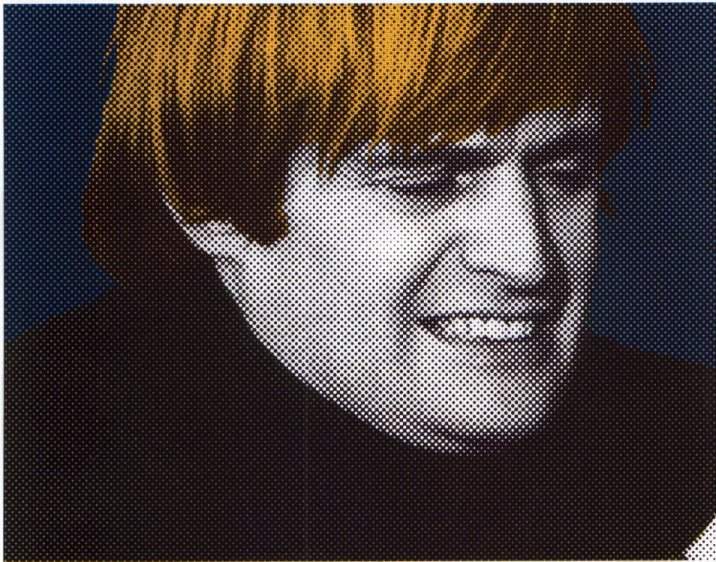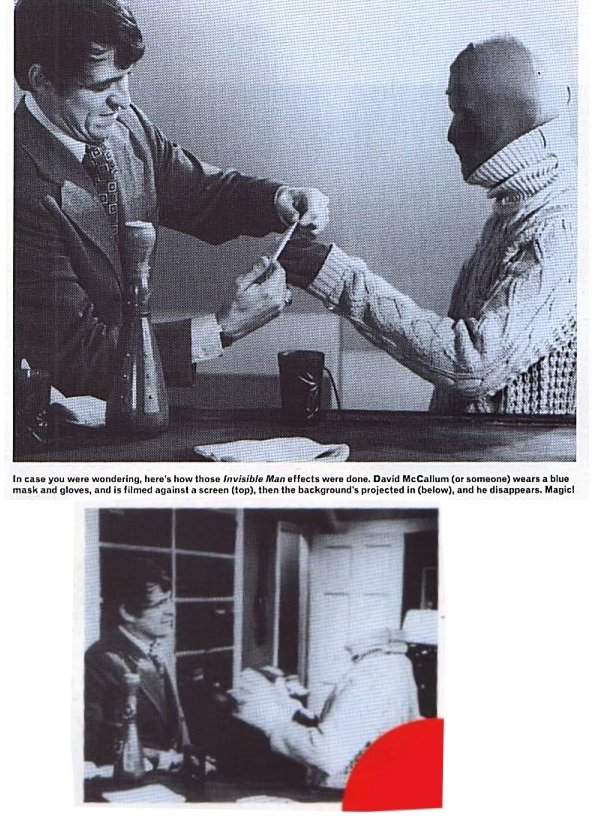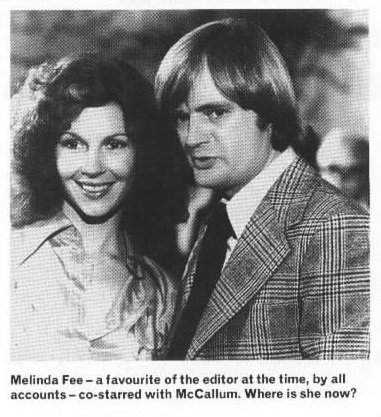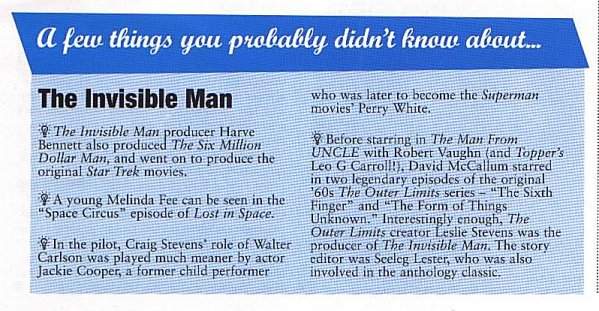
THE INVISIBLE MAN

There have been a number of Invisible Man TV shows over the years, two
of them British--a late '50's version (which had precious little to do with HG
Wells' original novel, and has recently been shown on ITV and Bravo),
and a
stylish 1984 six-parter, which adapted the 1897 novel quite faithfully. Neither,
however, bear more than a passing resemblance to the forgotten version
that
come in-between--an action-adventure which, despite the presence of Brit
star
McCallum, was pure Hollywood through and through.
Like the first TV version of the story, the McCallum show featured a
sympathetic Invisible Man, who used his strange abilities for good--and
was a far
cry from Wells' bitter, destructive character. As with the Six Million
Dollar man
before it, the pilot was surprisingly dark in tone, the regular series
that followed
lightening things up considerably. It began
with Doctor Daniel Westin
(McCallum) accidentally rendering himself invisible in a lab accident,
while
working for the sinister KLAE corporation. Later, when he discovers KLAE
wants to use his discovery for militaristic purposes, Westin destroys
his
equipment and the key to the process. Until he can return himself to
normality,
he decides to use his extraordinary powers for secret government missions
he
deems worthwhile, often aided by his wife, and all the time appearing in
public
under a lifelike rubber mask and gloves...
HG
Wells' original novel, and has recently been shown on ITV and Bravo),
and a
stylish 1984 six-parter, which adapted the 1897 novel quite faithfully. Neither,
however, bear more than a passing resemblance to the forgotten version
that
come in-between--an action-adventure which, despite the presence of Brit
star
McCallum, was pure Hollywood through and through.
Like the first TV version of the story, the McCallum show featured a
sympathetic Invisible Man, who used his strange abilities for good--and
was a far
cry from Wells' bitter, destructive character. As with the Six Million
Dollar man
before it, the pilot was surprisingly dark in tone, the regular series
that followed
lightening things up considerably. It began
with Doctor Daniel Westin
(McCallum) accidentally rendering himself invisible in a lab accident,
while
working for the sinister KLAE corporation. Later, when he discovers KLAE
wants to use his discovery for militaristic purposes, Westin destroys
his
equipment and the key to the process. Until he can return himself to
normality,
he decides to use his extraordinary powers for secret government missions
he
deems worthwhile, often aided by his wife, and all the time appearing in
public
under a lifelike rubber mask and gloves...
Invisible Men: A screen history
Invisible men were nothing new on film or TV when Dr. Westin had his
unfortunate accident. Back in 1933, for instances, horror veteran Claude Rains
had portrayed the lead character in James Whale's The Invisible Man.
The
Invisible Man Returns followed in 1940, this time starring Vincent Price
as the
luckless scientist. It was the espionage thriller Invisible Agent,
however, which
pitted John Hall against the Axis forces in 1941, that most closely
mirrors the
format of the McCallum TV show. There was also an Invisible Woman in
1941,
and an Invisible Boy in 1957, while everyone from Disney to Charles Band
has
had a go at exploiting the concept since.
Invisible monsters abound in TV episodes (Lost in Space, The X-Files,
etc.) and films (memorably Forbidden Planet and Predator) too, while the
more
obvious human delights of invisibility have been explored in various lame
teen
comedies (Zapped and The Invisible Maniac spring to mind). More
restrained
mischief-making is to be found in TV's Topper, Randall and Hopkirk
(Deceased),
and Quantum Leap, or cinema's Abbott and Costello Meet the Invisible
Man,
Ghost, and Memoirs of an Invisible Man, among others.
"Regular" TV heroes who've enjoyed brief spells of invisibility include
the
original Star Trek's William Shatner and three Next Generation crew
members,
Time Tunnel's James Darren, and--bizarrely!--Magnum's Tom Selleck.
Where are they now?
 For all the diversity of his roles on TV and occasionally--the cinema,
David McCallum always seems to be playing David McCallum, and The
Invisible
Man was no exception. He's a likeable guy, all the same, and makes for a
charismatic hero. There's no trouble finding him today, either--he's
escaped the
obvious typecasting as Illya Kuryakin of the Man From UNCLE by making
many
other TV and film appearances. In Britain, he's starred in shows like
the serials
Kidnapped and Colditz (recently reshown on UK Gold), as well as the
oddball
'80's Joanna Lumley co-starrer Sapphire and Steel, now reshowing on
Bravo.
More recently, he's been seen in Britain in the series Trainer, and in
the US
guested on Babylon 5 and co-starred in the cancelled VR5, soon to be
shown on
British TV.
Craig Stevens--blandly amiable and pally as the new 'viewer friendly'
Walter Carlson (as with The Six Million Dollar Man, the mean and
self-interested
boss from the pilot was given a genial facelift for the series)--was at
the end of
his career in '75. Back in 1964, however, he was charming the ladies as
"Mr.
Broadway." Earlier still, in the 50's, he was a frequent guest player
in various
drama series and enjoyed fame as TV cop hero Peter Gunn. When The
Invisible
Man ceased productive, however, he acquired a role in the popular
mini-series
Rich Man, Poor Man, and appeared in some episodes of Dallas in 1981.
Of Melinda Fee, however--so perky as McCallum's wife Kate--there has
been no sign. Perhaps she became invisible herself!
For all the diversity of his roles on TV and occasionally--the cinema,
David McCallum always seems to be playing David McCallum, and The
Invisible
Man was no exception. He's a likeable guy, all the same, and makes for a
charismatic hero. There's no trouble finding him today, either--he's
escaped the
obvious typecasting as Illya Kuryakin of the Man From UNCLE by making
many
other TV and film appearances. In Britain, he's starred in shows like
the serials
Kidnapped and Colditz (recently reshown on UK Gold), as well as the
oddball
'80's Joanna Lumley co-starrer Sapphire and Steel, now reshowing on
Bravo.
More recently, he's been seen in Britain in the series Trainer, and in
the US
guested on Babylon 5 and co-starred in the cancelled VR5, soon to be
shown on
British TV.
Craig Stevens--blandly amiable and pally as the new 'viewer friendly'
Walter Carlson (as with The Six Million Dollar Man, the mean and
self-interested
boss from the pilot was given a genial facelift for the series)--was at
the end of
his career in '75. Back in 1964, however, he was charming the ladies as
"Mr.
Broadway." Earlier still, in the 50's, he was a frequent guest player
in various
drama series and enjoyed fame as TV cop hero Peter Gunn. When The
Invisible
Man ceased productive, however, he acquired a role in the popular
mini-series
Rich Man, Poor Man, and appeared in some episodes of Dallas in 1981.
Of Melinda Fee, however--so perky as McCallum's wife Kate--there has
been no sign. Perhaps she became invisible herself!
So was it any good?
Although The Gemini Man, which revamped The Invisible Man concept
the following season, was a blander show, at least it avoided the
biggest
problem McCallum had by having the hero simply flip a switch to become
invisible. The trouble with The Invisible Man was that, while it was inventive
(and "realistic" after a fashion), the weekly rubber mask rigmarole took
a lot of
effort to film, and remained highly unconvincing. The blue screen work, although
vastly superior to British efforts at the time, always looked painfully
fake. And
that wasn't the only criticism....The face mask McCallum waved about when changing back and forth was clearly not capable of representing
McCallum's
features well enough to fool anybody, and no one to date has made an
'invisible
man' show where the objects being mysteriously moved around don't bob up
and
down as if being carried by a Thunderbirds puppet. It was also odd, as
many viewers commented on at the time, to think that Westin was performing
all his
missions in his birthday suit!
A bigger problem was voiced by McCallum himself--he hated the lighter
scripts that followed writer Steven Bochco's pilot (Bochco was later to
create the
highly successful Hill street Blues, LA Law, and NYPD Blue), saying the
he'd "signed up to do The Fugitive and ended up doing Topper." And light the scripts most definitely were--the first episode had
McCallum
and wife (Melinda Fee) doing a cheating-the-cheaters scam that was
already old
when Mission: Impossible did it. Another one went for the fake
spiritualist/haunted house cliche, while similarly predictable (if
slightly superior)
was "Sight Unseen", in which Westin rescues a blind girl from gangsters
(think
about it!).
There were better episodes, however, "Go Directly to Jail" was another
Bochco script, and had one of his typically clever ironies behind the
premise,
while "Attempt to Save Face" was a clever idea inside a stupid plot. Of
them all,
though, perhaps the best was "Power Play," which had an escapee from an
insane asylum discover Westin's secret within the KLAE laboratories.
This
episode tied in with the earlier "The Klae Dynasty" another of the
better
episodes, in which Westin played an invisible bodyguard.
inventive
(and "realistic" after a fashion), the weekly rubber mask rigmarole took
a lot of
effort to film, and remained highly unconvincing. The blue screen work, although
vastly superior to British efforts at the time, always looked painfully
fake. And
that wasn't the only criticism....The face mask McCallum waved about when changing back and forth was clearly not capable of representing
McCallum's
features well enough to fool anybody, and no one to date has made an
'invisible
man' show where the objects being mysteriously moved around don't bob up
and
down as if being carried by a Thunderbirds puppet. It was also odd, as
many viewers commented on at the time, to think that Westin was performing
all his
missions in his birthday suit!
A bigger problem was voiced by McCallum himself--he hated the lighter
scripts that followed writer Steven Bochco's pilot (Bochco was later to
create the
highly successful Hill street Blues, LA Law, and NYPD Blue), saying the
he'd "signed up to do The Fugitive and ended up doing Topper." And light the scripts most definitely were--the first episode had
McCallum
and wife (Melinda Fee) doing a cheating-the-cheaters scam that was
already old
when Mission: Impossible did it. Another one went for the fake
spiritualist/haunted house cliche, while similarly predictable (if
slightly superior)
was "Sight Unseen", in which Westin rescues a blind girl from gangsters
(think
about it!).
There were better episodes, however, "Go Directly to Jail" was another
Bochco script, and had one of his typically clever ironies behind the
premise,
while "Attempt to Save Face" was a clever idea inside a stupid plot. Of
them all,
though, perhaps the best was "Power Play," which had an escapee from an
insane asylum discover Westin's secret within the KLAE laboratories.
This
episode tied in with the earlier "The Klae Dynasty" another of the
better
episodes, in which Westin played an invisible bodyguard.
